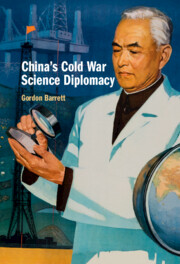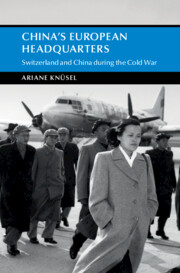China's Cold War Science Diplomacy
During the early decades of the Cold War, the People's Republic of China remained outside much of mainstream international science. Nevertheless, Chinese scientists found alternative channels through which to communicate and interact with counterparts across the world, beyond simple East/West divides. By examining the international activities of elite Chinese scientists, Gordon Barrett demonstrates that these activities were deeply embedded in the Chinese Communist Party's wider efforts to win hearts and minds from the 1940s to the 1970s. Using a wide range of archival material, including declassified documents from China's Ministry of Foreign Affairs Archive, Barrett provides fresh insights into the relationship between science and foreign relations in the People's Republic of China.
- Helps readers to understand the long-term underpinnings of China's subsequent 'rise' as a superpower in science and technology
- Examines the inner workings of China's foreign affairs system during crucial phases in its development
- For scholars of modern Chinese history, the history of science and Cold War history
Reviews & endorsements
'Original, deeply researched, masterful: Barrett's compelling and well-written volume provides new insights into China's influence on Cold War scientific internationalism.' Ronald E. Doel, Florida State University
'This sophisticated and lucid study is a major addition to scholarship on Mao-era China. It illuminates how - decades before the People's Republic of China emerged as a science and technology superpower - the country created an international position for itself through scientific engagement. Gordon Barrett's new book is the go-to work on this essential topic.' Julia Lovell, Birkbeck University of London
'Based on extensive archival research, this book demonstrates the significance of Mao-era science diplomacy-from the Pugwash conferences, to the World Federation of Science Workers, to the Peking Science Symposia and beyond. A must-read for anyone seeking to understand the roots of China's rise in international science and technology.' Sigrid Schmalzer, University of Massachusetts Amherst
'Gordon Barrett has probed deeply into a variety of sources in writing this interesting and suggestive book. He offers new insights into how science served China's united-front operations … the study also prompts us to think more carefully about science and international affairs in our current era of transnational science and technology.' Richard P. Suttmeier, H-Sci-Med-Tech
'In this ambitious analysis of Bavarian tourism from the early nineteenth century to the middle of the twentieth, Adam T. Rosenbaum offers fresh language for making sense of the German encounter with modernity.' Robert Terrell, H-TGS (h-net.org)
'Gordon Barrett has probed deeply into a variety of sources in writing this interesting and suggestive book. He offers new insights into how science served China's united-front operations in the period leading up to the establishment of the People's Republic.' Richard P. Suttmeier, H-Sci-Med-Tech (h-net.org)
'This is an extremely engaging and important book for scholars interested in the first decades of Mao's rule in China. It emphasizes the importance the regime gave to transnational scientific exchanges with sympathetic foreign scholars, defying the US attempts to isolate it after the Korean war up until the early 1970s. It is also a major contribution to studies of science diplomacy precisely because it describes (in as much detail as the archives consulted permit) a highly politicized mode of international scientific collaboration led by a 'developing' country in its first decades of state formation.' John Krige, The British Journal of the History of Science
'Anyone interested in scientific aspects of China's recent history will find this a well-documented and informative work. … This book begins with a detailed description of how China organized science following WWII, supporting the goals of the Chinese Communist Party, and how it aligned itself with the World Federation of Scientific Workers (WFSW) between 1946 and 1956. … Highly recommended.' J. W. Dauben, Choice
'… fills a salient gap in our current understanding of the Chinese Communist Party (CCP)'s science outreach activities between 1945 and 1972 [… and] opens new ground by elucidating scientists' roles in diplomatic venues.' Yi-Tang Lin, Isis
'[T]his is a noteworthy contribution to our understanding of the PRC's participation in international science during its first few decades. Beyond its China-specific insights, it also offers a valuable case of science diplomacy by a prominent socialist state during the first few decades of the Cold War.' Arunabh Ghosh, The Journal of Asian Studies
'In a field in which much time has been spent suggesting and critiquing definitions, Barrett's book is a welcome example of the value of a detailed, archival case study that helps to show the value of the category of science diplomacy for historians.' Pete Millwood, The China Quarterly
Product details
May 2025Paperback
9781108948401
272 pages
229 × 152 mm
Not yet published - available from April 2025
Table of Contents
- Acknowledgements
- Note on the text
- List of key abbreviations
- Introduction
- 1. A Scientific United Front at Home and Abroad: Chinese Communist Party-Aligned Science Organisations and the World Federation of Scientific Workers, 1946–1956
- 2. Between Pugwash and the party-state: Scientists, agency, and transnational activism in the early Pugwash Conferences on Science and World Affairs, 1955–1960
- 3. 'Friends and comrades, we fight against imperialism': The radical evolution of China's science diplomacy, 1960–1968
- 4. Linking the local, national, and international: Scientific organisations and foreign affairs in the 'Peking Science Symposium' conferences, 1964–1966
- 5. A spectrum of propaganda and scientific exchange: British socialist scientists and 'New China'
- Conclusion: Situating scientists in China's foreign relations
- Select bibliography
- Index.







